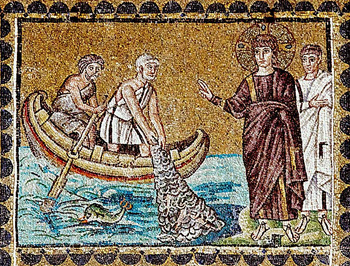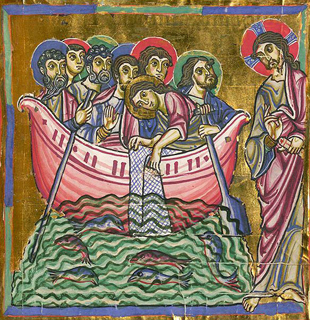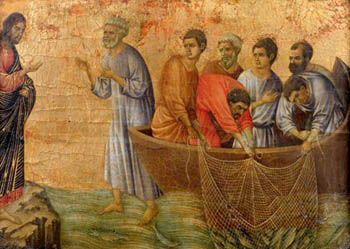For Sunday May 1, 2022
Lectionary Readings (Revised Common Lectionary, Year C)
Acts 9:1-6 (7-20)
Psalm 30
Revelation 5:11-14
John 21:1-19
From Our Archives
For earlier essays on this week's RCL texts, see the essay by Debie Thomas, You Know Everything; and the four essays by Dan Clendenin, Peter and Paul: Before and After, Renunciation and Return, Picking Up the Broken Pieces, and A Fire of Burning Coals.
Dan Clendenin founded JWJ in 2004.
In his Introduction to Matt Seitz's book The Wes Anderson Collection (2013), Michael Chabon explores the worldview of the award-winning filmmaker. When we are children, says Chabon, we experience the world as unbelievably big and beautiful, "full of marvels and surprises." But children also eventually discover that the world is "irretrievably broken,” with its "heartbreak, violence, failure, cowardice, duplicity, cruelty, and grief."
In the pangs of adolescence, we learn that beauty and brokenness can mix and mingle. We then try to reconcile these two experiences when they provoke "the ache of cosmic nostalgia, an intimation of vanished glory, a memory of the world unbroken." This second experience is as powerful as the first, says Chabon, and "the feeling haunts people all their lives."
 |
|
The Miraculous Catch of Fish, Sant'Apollinare Nuovo, Ravenna, 6th Century.
|
Adults respond to the shattered fragments of life in different ways. Some people sit among the shards and just try to survive. Others break the broken pieces into smaller and smaller fragments. And still others, writes Chabon, "passing among the scattered pieces of that great overturned jigsaw puzzle, start to pick up a piece here, a piece there, with a vague yet irresistible notion that perhaps something might be done about putting the thing back together again."
Such restoration will always be imperfect. We can't see the lid of the jigsaw puzzle with its perfect picture of the completed whole. Some pieces will be missing. Chabon compares these recreated worlds to a scale model of the broken original. They're partial approximations and imperfect replicas. But even with their imperfections they can be "faithful maps" of our "beautiful and broken world." That's what Wes Anderson does in his movies.
Picking up the pieces and restoring what’s broken is also what Peter and Paul do in this week's readings. It’s what we all must do. That’s because, as Solzhenitsyn observed, “the line separating good and evil passes not through states, nor between classes, nor between political parties either — but right through every human heart.” Nobody gets a free pass.
Making peace with this shadow side of myself thus becomes a fundamental challenge of spiritual maturity. In Christian parlance, we need conversion, the sort of conversion that’s a lifelong process.
Dirty, wet and tired after fishing all night and catching nothing, the disciples nonetheless followed Jesus's command to re-cast their nets one more time. The result was the miraculous catch of 153 fish. That number looks suspiciously symbolic, but there's zero scholarly agreement about what it means, except that it suggests the superabundant generosity of God.
After hauling their fish ashore, the disciples were met by Jesus and "a charcoal fire" (John 21:9). He greeted them with welcoming words, "come and have breakfast."
 |
|
The Miraculous Catch of Fish, 12th Century manuscript, Salzburg.
|
After breakfast, as they warmed themselves by the fire, Jesus asked Peter not once, but three times, "Peter, do you really love me?" Three times Peter replied, "Yes, Lord, you know that I love you." And then three times Jesus responded, "feed my sheep."
John employs a brilliant literary device here to connect two different stories. He writes how "Peter was hurt" by Jesus's three questions. I think that’s because the triple query by Jesus provoked a painful memory of Peter’s triple denial before another “charcoal fire.”
Camp fires can be deeply evocative. Just a few days earlier, Peter had stood around a “charcoal fire” during the arrest of Jesus, when he denied three times that he even knew Jesus, after bragging that he would never desert him like the others did. John describes how "it was cold, and the servants and officials stood around a fire they had made to keep warm. Peter was also standing with them, warming himself" (18:18). For both of these “charcoal fires” John uses the Greek word anthrakia, the only two occurrences of this word in the Greek New Testament.
Despite his triple denial at the first fire at night, and the triple query at the second fire in the morning, Jesus reaffirmed Peter three times with the words, "Feed my sheep." And so he forgave himself. He picked up the broken pieces to become the movement's unlikely but undisputed leader. There are three lists of the twelve apostles in the gospels, and in all three of them the imperfect and impetuous Peter is listed first.
Similarly, this week's reading from Acts tells the story of Paul's Damascus road conversion, which is mentioned eight times in the New Testament. Whether you think Paul’s conversion was for good or great ill (for example, Edward Gibbon), it altered western history. The greatest persecutor of the church became its greatest propagator, eventually traveling over 10,000 miles to spread the gospel before dying a martyr's death in Rome.
Before his dramatic conversion, Paul "breathed out murderous threats." He imprisoned believers, and tried to exterminate the church. He says that he was proud of his righteous zeal.
 |
|
The Miraculous catch of 153 fish by Duccio, 14th century.
|
Even as an old man Paul was haunted by his sordid past, writing to his young protege Timothy: "I was once a blasphemer and a persecutor and a violent aggressor." He called himself "the worst of sinners." But, like Peter, Paul made peace with his broken past and his shadow self: "forgetting what is behind and straining toward what is ahead, I press on toward the goal to win the prize for which God has called me heavenward."
In the poem "Phase One" from her book Bring Now the Angels (2020), the Bangladeshi-American Dilruba Ahmed interrogates herself for the many manifestations of her shadow self. She leaves the fridge door open all night. She forgets to tend her plants. She feels like a bad mom. She loses her luggage. She’s very hard on herself, and so the poem is all about learning to forgive herself as a necessary precursor to loving others.
The word “forgive” occurs thirteen times in the poem like a sort of mantra that she repeats to herself, building to a crescendo. First, one time, “I forgive you.” Then twice: “I forgive you. I forgive you.” And then, having treated her mother with contempt when she deserved compassion, three times: “I forgive you. I forgive you. I forgive you.”
And so the title of the poem — forgiving myself is the “first phase” of spiritual maturity. It’s a necessary beginning. Compassion towards myself liberates me to love others. In the last four lines of her poem, Ahmed even forgives herself for not forgiving herself: “For being unable / to forgive yourself first so you / could then forgive others and / at last find a way to become / the love that you want in this world.”
In his book Art and Faith (Yale, 2021), Makoto Fujimura devotes an entire Chapter 4 to kintsugi — literally, “golden joinery.” In kintsugi as an artistic technique, instead of hiding a flaw in a piece of broken pottery, the artist highlights and even celebrates the damage by repairing it with a special lacquer that is dusted or mixed with gold, silver, or platinum. The restoration is more beautiful than the original precisely because of rather than despite its repaired brokenness.
Kintsugi is also a more general philosophy that understands breakage and repair as normal parts of human life. Instead of denying or hiding our faults and failures, we embrace our imperfections. In this Japanese aesthetic, the wear, tear, and damage on a physical object are marks of beauty to treasure and honor, not a reason to discard it.
Fujimura calls his chapter on kintsugi “the new newness.” I like that. Like a gold-dusted piece of repaired pottery, there can be beauty in my brokenness.
A Weekly Prayer
My Own Heart by Gerard Manley Hopkins (1844–1889)
My own heart let me have more pity on; let
Me live to my sad self hereafter kind,
Charitable; not live this tormented mind
With this tormented mind tormenting yet.
I cast for comfort I can no more get
By groping round my comfortless, than blind
Eyes in their dark can day or thirst can find
Thirst ’s all-in-all in all a world of wet.Soul, self; come, poor Jackself, I do advise
You, jaded, let be; call off thoughts awhile
Elsewhere; leave comfort root-room; let joy size
At God knows when to God knows what; whose smile
’s not wrung, see you; unforeseen times rather — as skies
Betweenpie mountains — lights a lovely mile.
Gerard Manley Hopkins (1844-1889) was an English poet and Catholic priest, educated at Oxford. Since Hopkins never gave permission for the publication of his verse, his Poems, edited by his friend Robert Bridges, did not appear in print until 1918.
Dan Clendenin: dan@journeywithjesus.net
Image credits: (1) Pemptousia.com; (2) Pemptousia.com; and (3) Wikipedia.org.





